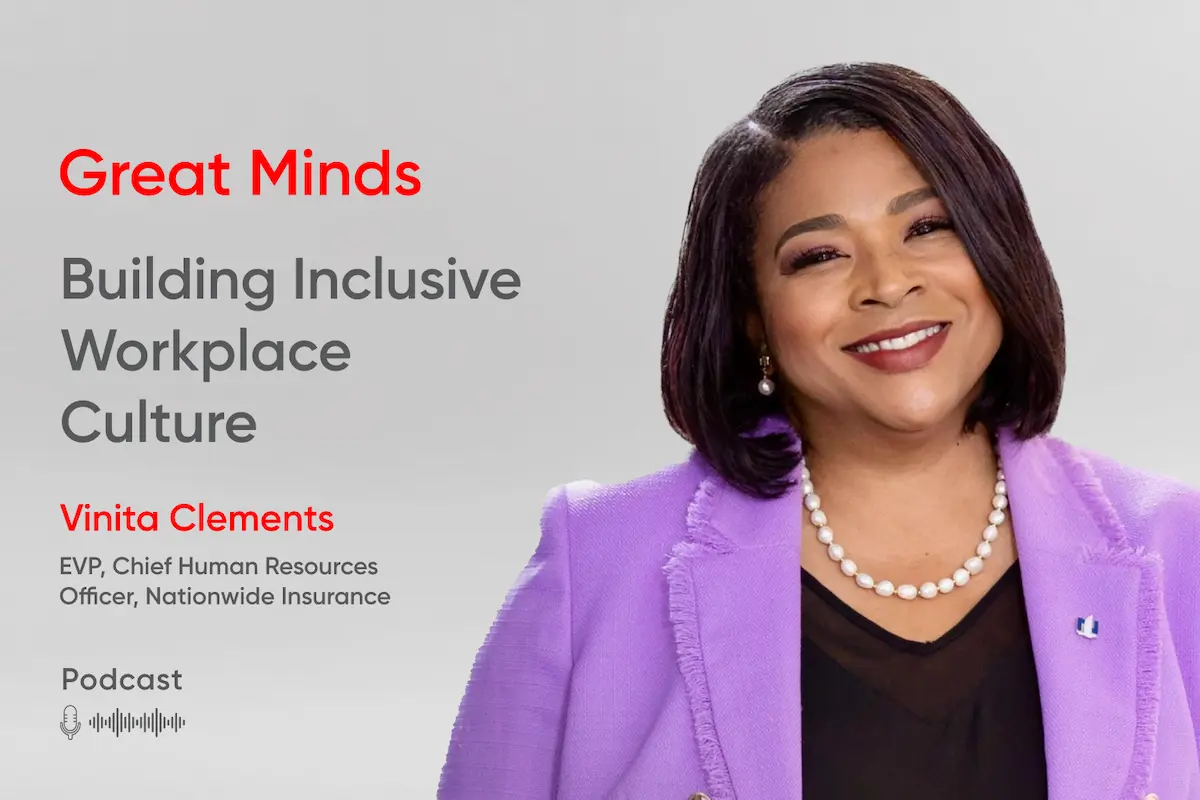“We no longer can be concerned only with work experience. We have to be concerned with the life experience of our associates.”
On this episode of the Great Minds podcast, Vinita Clements, EVP, CHRO of Nationwide, talks about the importance of belonging at work, and why it’s mistakenly overlooked as a soft skill and not a business imperative.
Podcast Highlights
- Belonging as a Business Imperative: Vinita Clements emphasizes that belonging, often dismissed as a "soft skill," is crucial for organizational success and has a direct impact on the bottom line.
- Leadership and Active Listening: Active listening is key to fostering trust and open communication at Nationwide. Initiatives like coffee chats and listening sessions allow employees to share their concerns and ideas in real time.
- Leveraging Employee Resource Groups (ERGs): Nationwide's 15 Associate Resource Groups (ARGs) play a vital role in enhancing diversity, equity, and inclusion while driving retention and recruitment through word-of-mouth.
- Evolving Workplace Culture: A dynamic and inclusive culture is essential for remote and hybrid environments. Vinita discusses the importance of asking employees what they need and taking actionable steps to meet those needs.
She shares how active listening from leadership is key to the company’s communication strategy, and why having tough conversations — even without having all the answers — keeps employees connected to the company.
On why belonging gets overlooked — and its impact on the bottom line:
It gets overlooked because it’s a soft skill, and sometimes causes conversations to go in a place where leaders may not know how to navigate.
So, there is a sense of courage in communication — not necessarily having all the answers and not feeling as though you have to. Being heard is key. If you feel like you can be heard, and you have a place where you can talk.
That’s why it sometimes gets overlooked. It's much easier to say, "Here's our results and here's where we're lacking, and let's stay focused on that."
But you have to bring the full associate to work. What I've often said is we no longer can be concerned only with work experience. We have to be concerned with the life experience of our associates. Families are much more important. So how do we assist our associate and their family? How do our benefits show that and demonstrate that?
We use our partnerships as a way to enhance belonging for our entire population. Belonging sometimes means, “I might not feel like I'm doing the work here in this portion of my job, but Nationwide allows me to work with the food bank or Nationwide allows me to work with the Columbus Symphony Orchestra.”
When people feel they're in a position to serve and give back, they feel a stronger sense of belonging. And that's what I mean about leaders having the responsibility to talk to their associates, understanding what's on their hearts and minds.
Stats have shown that when people feel they have trust and open communication, they're 50% more productive. That works for the bottom line.
On the importance of listening:
The first rule of engagement is that people need to feel connected to their teams and to their leader. We have leadership training that helps leaders understand how to run team meetings and how to connect with their team – what are some open-ended questions to really start a conversation, and what to listen for. Teaching them how to be active listeners is a pillar in our communication and listening strategies.
Our CEO does coffee chats, and we hold listening sessions where people ask questions in real time. No question is barred.
What we have promoted is conversation. And in those conversations, people will talk about what they want. They'll talk about, "I have a passion here. I don't feel like I'm connected. And here's why."
On the value of employee resource groups:
We have 15 associate resource groups and use them as a voice. Retention strategies became really, really important. And so, this demonstrates how we use this group.
I combined our talent acquisition office, which is the group that hires, and our DE&I office, together under one leader. It's proving to be a best practice now.
Our partners in our DE&I space became even greater partners as we have job openings.
Now we're tied into all of those partners with openings. We make sure that the ARGs understand what jobs we have open. So they have friends and it becomes word of mouth.
And we have had great success on increasing our diversity and equity overall because we use our ARGs in a way that demonstrates that we need you. We can utilize the power that your group has, and it helps Nationwide overall.
On the need to continually evolve company culture:
People ask, "What are the next steps for a culture? You're a Great Place To Work, you’re at your highest engagement."
For me, it is an interactive culture. The culture can't stay stagnant, especially in an environment where people work in different places, in different times. And how do you make sure that your culture is alive?
And so, one of the priorities and strategies is to evolve the inclusive culture that we have. And that means, really, people go, "Oh yeah, but how do you do that? That seems hard."
And I go back to listening. If you ask people what they need and what they want, they will tell you. But you then have to go and figure out how to help implement and how to utilize those groups of people to make a difference.
FAQs
- Why is belonging often overlooked in the workplace?
Application: Belonging is frequently dismissed as a soft skill because it requires courage in communication and navigating complex conversations. Leaders can address this by fostering a culture of listening and ensuring employees feel heard and valued. - How can leaders actively improve communication and listening skills?
Application: Implement leadership training focused on active listening, running inclusive team meetings, and asking open-ended questions. Create opportunities for real-time conversations, such as coffee chats and listening sessions, to build trust and engagement. - What role do Employee Resource Groups (ERGs) play in fostering diversity and inclusion?
Application: ERGs serve as a voice for employees, support recruitment efforts, and enhance retention. Leverage their networks to promote job openings and build an inclusive environment that strengthens organizational culture and equity. - How can companies sustain and evolve their workplace culture?
Application: Create a dynamic and inclusive culture by continuously seeking employee feedback. Use their insights to implement strategies that keep the culture alive and aligned with the evolving needs of a remote or hybrid workforce.
Tools & Resources
- Company Culture: Build a workplace where belonging thrives. Our resources offer actionable steps to embed culture into your business strategy, enhancing trust, engagement, and overall satisfaction.
- Employee Engagement: Boost workplace morale with tools designed to foster open communication and accountability. Discover methods to reduce employee stress and create a highly motivated workforce.
- Leadership & Development: Transform your leaders into active listeners and culture builders. Explore programs that equip them to inspire collaboration, address challenges with courage, and prioritize well-being.
- Diversity and Inclusion: Empower your organization to harness the strength of diversity. Access strategies to advance equity, leverage employee resource groups, and build a truly inclusive workplace.
Feedback
Your feedback matters! We’d love to know how the insights shared in this podcast—on belonging, leadership, and evolving workplace culture—connect with your organization’s goals. Did these strategies inspire new initiatives or ideas? Are there other topics you’d like us to explore further? Your input helps us enhance our tools and resources to better support your journey. Share your thoughts with us by filling out this form: click here.
Get Certified 
Think your company is a Great Workplace? Get certified today to make it onto our best workplaces lists.
Original Podcast Published by Great Place To Work® USA : Click here to visit the page.







